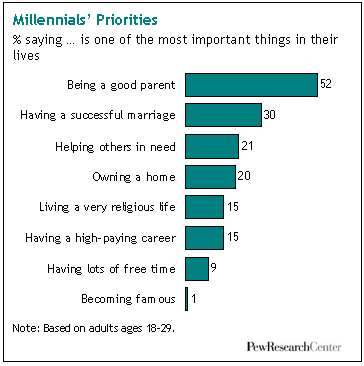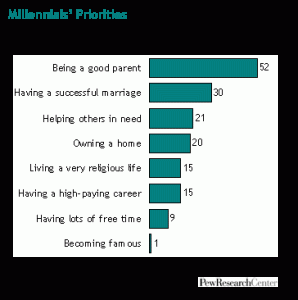Last week I went to a comedy show in Old City where the comedians and most of the audience were in their 20s, perhaps some in their early thirties. One comedian, riffing on the strange habits of co-workers, began his set up with this question to the audience: “How many of you don’t like your jobs?”
Guess what? There were about 3 people, including myself and my friend (a law professor) who indicated we were happy with our work. I imagine this crowd of Millennials isn’t exactly a random sample; but with all these dissatisfied employees, needless to say there were some good implications for MY job as a career counselor. Clearly there will be a demand for the kind of service I provide from the upcoming generation.
And so I began to wonder, what was going on? Was this about the economy and the lack of opportunity for 20-somethings? Was this about the contagion of emotions, so if you work in a place with a negative atmosphere or are surrounded by friends with discontented attitudes you too may adopt the negative mood? Is it just plain cooler to complain?
I admit I don’t yet have an answer to the questions posed. I could see that there may be some positive value in being collectively disgruntled, a strength in feeling that if things aren’t “right” at least you can commiserate.* But my reaction is to consider the opposite approach: that finding what you like in work gives you the energy to address problems or make changes and a sense of purpose and satisfaction. For example, there I was on my time off, finding the opportunity to think a little more deeply about my work while listening to the audience laugh at the pitfalls of a comedian with a coworker who blamed the office printer for the flatulent noises coming from his cubicle.
Few individuals find their work life perfect, but each can make the choice of focusing on what they do enjoy. Like today’s Millennials, I graduated from college into a recession, and along with many other young people landed two part time jobs doing entry level work that was not very intellectually engaging. Even so, I found that I enjoyed a feeling of professionalism, because I knew the employers I worked for needed my efforts, I liked helping people, getting recognition for my work, and organizing and implementing my own projects. Eventually I chose my profession, returning to school for a graduate degree in counseling based on the insights I gained from my administrative positions.
You can find your work in the “complaints department,” perceiving your experience as bad if there are elements you don’t like, but even a job with clear limitations – one that is frustrating or “dead end” – can give you something positive in the future including an ability to face challenges, know yourself better, and at the very least make a memorable joke.
* There is a fair amount of information out there about how negativity affects the workplace. See this article on complaining in the workplace and note Wharton Professor Sigal Barsade’s work. (Also see: http://knowledge.wharton.upenn.edu/article.cfm?articleid=1708.)



